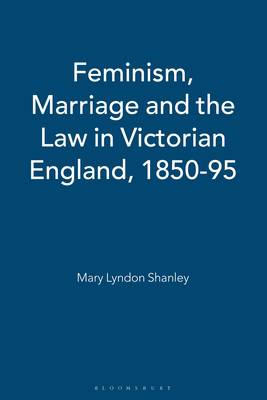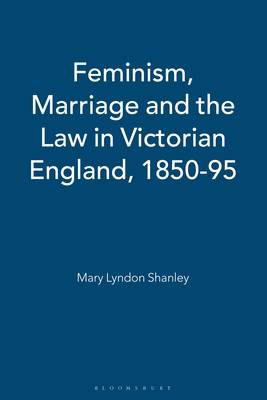
- Afhalen na 1 uur in een winkel met voorraad
- Gratis thuislevering in België vanaf € 30
- Ruim aanbod met 7 miljoen producten
- Afhalen na 1 uur in een winkel met voorraad
- Gratis thuislevering in België vanaf € 30
- Ruim aanbod met 7 miljoen producten
Zoeken
€ 72,95
+ 145 punten
Omschrijving
"Important both for political theorists and for women's studies. She explores with great care and thoroughness the connections between nineteenth century feminist argument and activism on the one hand, and familiar liberal principles of justice and equality on the other" - Nannerl 0. Keohane, Wellesley College
Traditional studies of the women's movement in Victorian England focused on the battle for suffrage and other public rights. In this new study, however, Mary Lyndon Shanley explores how Victorian women campaigned to reform the laws which related to marriage and the married state.
Arguing that without a fundamental transformation of the marriage relationship there would be no justice for women, they fought a series of campaigns to change laws governing divorce, married women's property, infanticide, protective labour legislation, child custody, wife abuse, marital rape and the "restitution of conjugal rights".
Women involved in these campaigns exposed the connection between the privileged position of men in both public and private life and the reluctance of Parliament to enact the reforms women sought. In a series of case studies Shanley explores the demands of the reformers, and the response of Parliament.
In an Epilogue, Shanley warns of the dangers to liberal feminism in relying exclusively on equal rights in the law as a formula for change.
Traditional studies of the women's movement in Victorian England focused on the battle for suffrage and other public rights. In this new study, however, Mary Lyndon Shanley explores how Victorian women campaigned to reform the laws which related to marriage and the married state.
Arguing that without a fundamental transformation of the marriage relationship there would be no justice for women, they fought a series of campaigns to change laws governing divorce, married women's property, infanticide, protective labour legislation, child custody, wife abuse, marital rape and the "restitution of conjugal rights".
Women involved in these campaigns exposed the connection between the privileged position of men in both public and private life and the reluctance of Parliament to enact the reforms women sought. In a series of case studies Shanley explores the demands of the reformers, and the response of Parliament.
In an Epilogue, Shanley warns of the dangers to liberal feminism in relying exclusively on equal rights in the law as a formula for change.
Specificaties
Betrokkenen
- Auteur(s):
- Uitgeverij:
Inhoud
- Aantal bladzijden:
- 220
- Taal:
- Engels
Eigenschappen
- Productcode (EAN):
- 9781350189072
- Verschijningsdatum:
- 25/02/2021
- Uitvoering:
- Paperback
- Formaat:
- Trade paperback (VS)
- Afmetingen:
- 156 mm x 234 mm
- Gewicht:
- 317 g

Alleen bij Standaard Boekhandel
+ 145 punten op je klantenkaart van Standaard Boekhandel
Beoordelingen
We publiceren alleen reviews die voldoen aan de voorwaarden voor reviews. Bekijk onze voorwaarden voor reviews.








